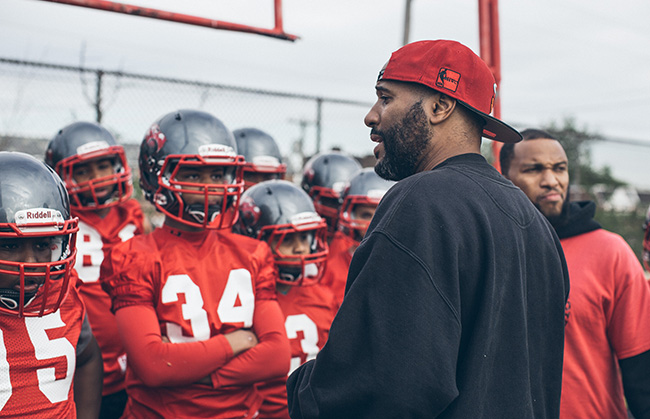
Riddell’s Smarter Football Program Aims to Make Game Safer
Last week, the football equipment company Riddell kicked off the second year of its Smarter Football program with the company pledging $100,000 in equipment to community teams that demonstrate safe playing habits.
Smarter Football launched in 2015 with the goal of making the game safer. The idea is two-fold: Teams prove their commitment to safety, and Riddell provides equipment and technology that is designed to ensure player health.
In the first year of the program, Riddell received nearly 700 grant applications and distributed equipment to seven teams ranging from Pop Warner to high school.
One recipient of a Smarter Football donation was the JuniataThundercats, a Pop Warner football program based in Philadelphia. The team won a grant after demonstrating both a need for better equipment and a commitment to safety through practice habits and community service.
Thundercats coach Lee Taggart was a self-proclaimed “bruiser” during his playing days at Howard University. He suffered multiple concussions and participated in dangerous, violent drills in practice. But he’s taken a very different approach as the head of a team.
“I said if I ever had the opportunity to be a coach, I would look for ways to protect the players a bit more,” Taggart says. “Years ago, we instituted non-tackling to the ground drills in practice, using pads to protect each other. It’s good to see that a lot of that stuff is coming out now.”
As Taggart led two teams of less than 40 total players to the forefront of a safety movement, he also studied bioethics at the University of Pennsylvania. For his thesis paper, he examined the NFL’s moral obligation to disclose all of the information it had on head trauma.
“It challenged me to really grapple with the issue – loving the game so much, but looking at it from a moral and ethical perspective,” Taggart says. “I was able to talk to [my fellow coaches] and say, ‘This is something that we really
gotta get in front of and start to think about.’”
The Thundercats have since grown to an organization of six teams with about 125 players ranging from 5 to 14 years old. Some of them have now experienced the excitement of new uniforms. But what’s ultimately more important than the fresh red jerseys and sleek silver helmets is the technology underneath.
All of Taggart’s players will now wear new Riddell Speed helmets. Some will feature the InSite alert system, which provides data and alerts on impacts to the head.
The system can be adjusted by position and level of football — a high-school player can typically handle a harder hit than a youth-league player. When one big hit or too many smaller hits occur over a period of time, coaches are alerted on a small device that tells them a player needs to be tested for a concussion.
The InSite system won’t soften the blow when players do get hit, though. To do that job, Riddell designed the SpeedFlex helmet. The helmet features flexibility in the facemask and shell, padding that acts like memory foam, and a ratchet-style chinstrap for a more secure fit.
Getting this kind of equipment into the hands — and onto the heads — of kids is important for everyone: players, coaches, and Riddell itself.
Erin Griffin, Riddell’s director of corporate communications, says she feels that whether it be education, technology or equipment, Smarter Football works toward Riddell’s ultimate goal: protecting football players.
“We think kind of all that collectively will usher the game of football into a new era of protection and performance,” Griffin says. “We take great pride in how we’ve been able to work closely with the game of football.”